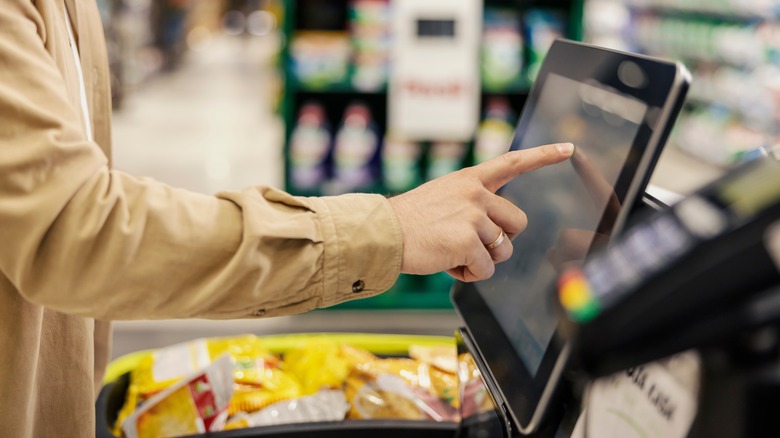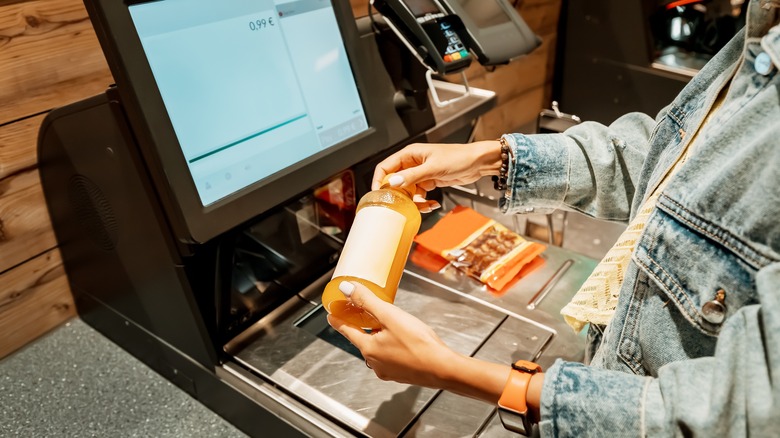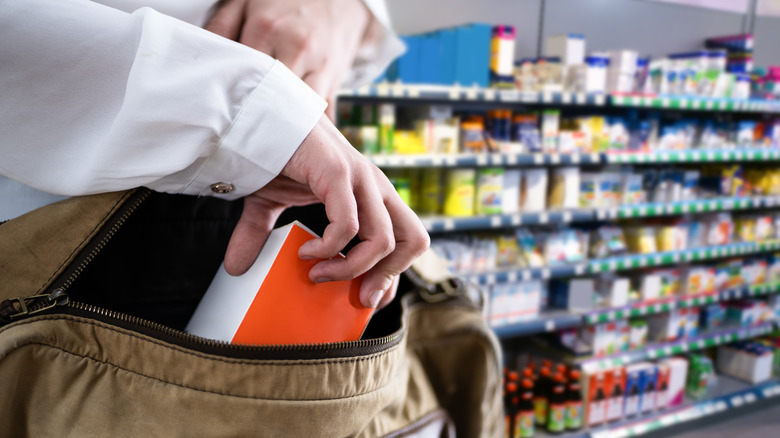Why Grocery Stores Can't Stop Self-Checkout Theft
While there are plenty of ways you could unknowingly break grocery self-checkout etiquette, the action with the most severe repercussions is theft. In recent years, grocery stores across the world have reported annual losses of up to 4% due to self-checkout theft — numbers more than double the industry standard. There's no right answer for how to stop this kind of theft, leaving companies in an uncertain place.
Sme of this theft is accidental. Shoppers might not notice that they've missed the scanner when ringing up their items, or they simply don't see a small item that's tucked into a corner of their shopping cart. However, according to a survey of 2,000 U.S. consumers by LendingTree, 15% of self-checkout users have admitted to intentionally scanning cheaper items in place of more expensive ones, sneaking items into bags without scanning them, or using a counterfeit barcode. In an attempt to curb theft, some stores are increasing surveillance cameras, and/or turning to technology that can detect missed items and suspicious shopper behavior.
The downside is that this technology is expensive, and no machine is perfect. For instance, overly sensitive scales in the bagging area may be set off by groceries settling in their bags or being rearranged, while AI alerts may be triggered by totally innocent actions. Either way, any self-checkout kiosk errors have to be assessed and reset by an employee, which pretty much defeats the purpose of self-checkout in the first place.
Despite theft, stores still cling to self-checkout
Even with all the problems caused by self-checkout, the practice still has benefits — at least, in theory and mostly for corporations. Self-checkout kiosks allow a store to relocate its employees to departments besides checkout, which means each store ultimately hires (and pays) fewer people. This means saving money on labor while pocketing more revenue. Self-checkout may be easily targeted by shoplifters, but some stores consider these small losses preferable to paying additional employees.
Another positive of self-checkout is that newer technology can give shoppers a second chance to correctly scan items, or at the very least, catches them on surveillance for future reference. Such an approach can help keep employees safe from on-the-spot confrontations accusing shoppers of theft, which may become violent. Self-checkout cameras also provide evidence for investigations, should the store choose to look into incidents and press charges.
However, old-fashioned cashier checkout still results in far less theft or attempted theft than self-checkout. An analysis by Grabango found that self-checkout machines caused 16 times more retail "shrink" (loss of store inventory from causes other than legitimate sales) than checkout via cashier. And even if a shopper is observed stealing in a self-checkout lane, it can be hard to prosecute them.
Accusation of theft requires strong evidence
A decent chunk of self-checkout theft can be caught by either technology or employee observation, but the fact remains that most shoplifters get away with it. Many stores, in both the food industry and others, instruct their employees not to approach shoplifters due to the potential for a violent escalation. Employees may be told to offer shoppers help in order to keep an eye on them, but even if suspicious behavior is observed, the U.S. Department of Justice recommends that shoplifters only be apprehended if they've been witnessed taking and concealing an item, then leaving the store without paying for said item.
To follow this recommendation, multiple employees will likely have to watch a potential shoplifter throughout their entire stay in the store to ensure they are indeed committing theft and not just behaving oddly. After all, it would create liability for both employees and the store if they accused someone of stealing, only to discover that theft hadn't actually occurred. This is yet another reason why many stores are just counting their losses and not interfering too much with self-checkout theft.



